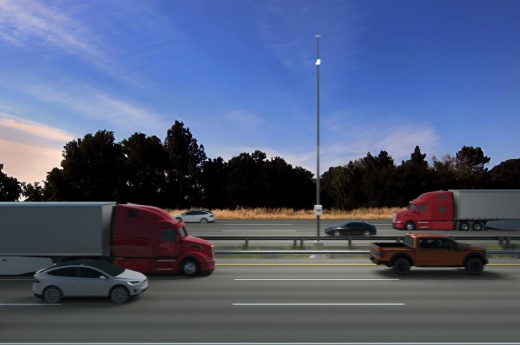Leading the charge in the Austin area is autonomous truck company Kodiak Robotics, which is already hauling IKEA furniture, C.R. England refrigerated products and Tyson Foods chicken daily on Texas roads.
Currently, Kodiak trucks have a “safety driver” monitoring the truck as it carries freight for hundreds of miles. By the end of the year, Kodiak will begin sending trucks out solo.
In case you missed it
In the past year, Central Texas has become a hub for autonomous vehicle companies to pilot new technology.
Autonomous vehicle company Cruise launched over 100 self-driving taxis in Austin for just over a year before pausing operations last October due to safety concerns, and Waymo's self-driving Jaguars are rolling through Austin’s streets as of March 6.
Dig deeper
Dan Goff, head of policy at Kodiak, said autonomous trucks differ from cars as they have more predictable driving patterns and have fewer obstacles, such as pedestrians, cyclists and stop lights, compared to taxis.
Kodiak trucks have 18 different scanners that monitor all parts of the truck 10 times every second, Goff said.
Anytime Kodiak's safety drivers intervene and take control of the wheel, its system registers the incident. Those incidents are subsequently incorporated into Kodiak's safety simulation to help the trucks learn how to handle such situations, Goff said.
Years of data collection and assessment have primed Kodiak officials to develop a safety case proving the trucks are as safe as a human driver, Goff said. He expects Kodiak to produce technology that makes autonomous trucks safer than a human driver in the coming years.
“The Kodiak system doesn't get tired, it doesn't get distracted, it doesn't check its phone, it doesn't have a bad day and take it out on the road,” Goff said.
The breakdown
All autonomous vehicle companies are required to self-report any crash incidents, no matter how minor, to the National Highway Traffic Safety Administration. Kodiak has reported three crashes total, all of which were minor, Goff said.
Waymo and Cruise take the lead in collisions among autonomous vehicles with 240 and 151 crashes respectively, according to data collected from July 2021 to Feb. 15 from the NHTSA. Third in line is General Motors, which owns Cruise, with 144 crashes, according to NHTSA.
Cruise and Waymo have on average larger fleets than autonomous truck companies do, and those vehicles handle a different set of obstacles on local roads than trucks do on freeways.
The why
Goff said Texas’ roads have been an ideal place to launch autonomous truck technology, as the state covers some of the richest freight corridors in the nation.
November data from the American Trucking Associations revealed truck tonnage will grow by almost 3 billion tons by 2034, which the organization said secures trucking as the dominant mover of goods in the nation.
Despite those projections, Goff said the growing industry faces a “significant” labor shortage that autonomous vehicles could remedy.
“We face real challenges around trucking, around people not wanting to drive trucks and there being a shortage of truck drivers to it being a really difficult life for truck drivers,” he said. “If you can automate those 1,000-mile stretches, it will have a real impact on our economy.”
Rich Steiner, vice president of government relations for autonomous truck company Gatik, said autonomous transportation companies have received “fantastic” support from the Texas Department of Transportation and the Department of Safety.
Texas’ supportive regulatory culture sprouted from Senate Bill 2205, a law passed by the Texas Legislature in 2017 that prohibits cities from regulating autonomous vehicles due to their economic potential.
“Driverless trucks offer great potential to provide safer and reliable freight transportation,” said Darran Anderson, TxDOT’s director of strategy and innovation. “They also have the potential to alleviate supply chain challenges, growing consumer demand for all-day goods delivery and growing truck driver shortages.”
What else?
Gatik, which specializes in medium-length trips from single digits to 150 miles long, will also begin going “freight only” in Texas by the end of the year. The company already transports goods for Walmart, Tyson, Kroger and others without a driver in Ontario and Arkansas.
Autonomous truck company Aurora will chart a similar path by year’s end, removing drivers. The company currently has routes in Houston, Fort Worth and El Paso with plans to expand to Central Texas.
What’s next
TxDOT is developing a 21-mile “smart corridor” on SH 130 from Georgetown through Del Valle. The stretch will be equipped with sensors and cameras that will help autonomous vehicles navigate road conditions and any potential hazards, according to road technology company Cavnue.
Details on when the smart corridor will officially launch have not been announced.





